Contents
Prostatitis is a common prostate disease that affects many men around the world. Inflammation of the organ is caused by a number of reasons, which is important to consider when determining the tactics of treatment for each individual patient. The scheme is drawn up on an individual basis and very often it is not possible to do without antibacterial drugs.
When is antibiotic treatment indicated?
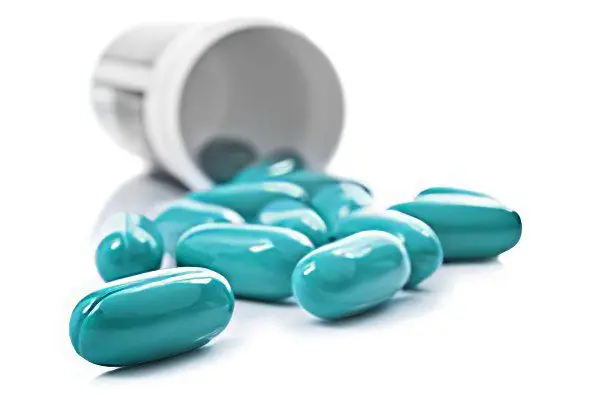
Prostatitis can be caused by bacteria, or it can be non-infectious in nature. In the latter case, the appointment of antibiotics, as a rule, is not required. They should be taken if the prostatitis has an acute or chronic course against the background of bacterial damage to the prostate gland. In this case, the severity of the symptoms does not matter. Often, chronic bacterial prostatitis generally occurs without any signs indicating the presence of inflammation. In addition, the appointment of antibacterial agents may be due to test therapy, even against the background of abacterial inflammation.
It is very important to follow all the points of diagnosing prostatitis in order to find out the cause of inflammation, identify the pathogenic agent and determine its individual sensitivity to a particular drug:
The first stage of diagnostic studies. The first stage includes:
Blood sampling for clinical analysis.
Urine sampling for bacterial culture, for a three-glass sample.
Sampling of the urethral epithelium for the detection of STIs by PCR, including chlamydia, mycoplasmosis, gonorrhea, etc.
Collection of prostate secretion for a comprehensive study.
Ultrasound examination of the prostate.
Blood sampling to determine the level of PSA in it, which makes it possible to exclude prostate cancer.
The second stage diagnostic studies: When the content of leukocytes in the prostatic secret does not exceed 25, then testing with the drug Omnic (tamsulosin) is indicated. It is taken for a week, after which the secret is taken for analysis again.
The results of the examination determine the type of prostatitis

abacterial prostatitis. When even against the background of taking the drug Omnik, there is no leukocyte jump, and bacteria are not found in the crops, then the inflammation of the prostate gland is defined as non-bacterial. This condition is called pelvic pain syndrome, which requires symptomatic therapy.
At the same time, the patient is waiting for the result of tests for tuberculosis, which will be ready in at least 10 weeks. If they are positive, then the patient is placed in an anti-tuberculosis dispensary (in the urological department).
Tuberculous prostatitis. You can determine the disease by performing a biopsy of the prostate. The infection most often affects not only the prostate gland, but also the epididymis, urinary system, seminal vesicles. Despite the fact that tuberculosis is becoming epidemic in the Russian Federation, and not only the lungs, but also other organs are affected, the diagnosis of this disease presents certain difficulties. The danger lies in the fact that more and more special forms of the disease are caused by bacteria resistant to therapy.
Tuberculosis of the genitourinary system of men often develops latently, without giving acute symptoms. Laboratory studies can give a false negative result, especially if a man takes antibiotics for prostatitis from the fluoroquinlone group.
Symptoms that may indicate prostate tuberculosis are low-grade fever, aching or burning pains in the perineal region, in the lumbosacral region, and increased fatigue. The age of patients in whom tuberculous prostatitis is most often detected is in the range between 20-40 years.
Bacterial infectious prostatitis. In the event that the analysis of the secret of the prostate indicates leukocytosis with an increase in the number of leukocytes over 25, and taking Omnik makes this figure higher, then it makes sense to talk about bacterial or latent infectious prostatitis. Antibacterial therapy in this case is carried out without fail.
The PCR method allows, after a day, to identify the existing pathogens of a sexual infection, so the doctor will be able to recommend taking this or that drug at the next visit. The drug of choice remains the agent for which the established flora has maximum sensitivity, or an antibiotic is prescribed that is active against most pathogenic agents.
If there is no effect from the ongoing treatment, then it is necessary to wait for the result of bacteriological seeding, which makes it possible to more accurately determine the choice of remedy.
What antibiotics are most effective for prostatitis?

It is impossible to determine any specific antibiotic for bacterial prostatitis that would help all men without exception in the treatment. It all depends on the sensitivity of the microbes that caused the disease in each case.
If specific bacteria are not detected, then medication is recommended based on culture of prostate secretion. There, nonspecific streptococci and staphylococci are most often detected.
Treatment involves an integrated approach and lasts for 30-60 days:
An antibiotic is prescribed.
Indication of NSAIDs.
You should take funds aimed at normalizing blood circulation.
Immunostimulating therapy is carried out.
Vitamin complexes or monovitamins are prescribed.
In some cases, phytotherapy is prescribed.
Thermal microwave therapy, prostate massage can be performed only when tuberculosis is excluded. Otherwise, the disease may worsen, which will worsen the patient’s condition.
Sedative drugs, antidepressants are recommended for men with chronic prostatitis against the background of the development of depressive moods, with a deterioration in the quality of life. In this case, psychotropic drugs are auxiliary.
Depending on which pathogen is identified, one or another antibiotic for prostatitis is selected.
The sensitivity of pathogenic microorganisms to antibacterial drugs is presented in the table:
| Tetracycline drugs | Preparations of the penicillin group | Cephalosporins | Macrolides | Fluoroquinolones |
Mycoplasmas | + | + | + | ||
Ureaplasma | + | + | + | ||
chlamydia | + | + | + | ||
Gonococci | + | + | + | + | |
Enterococci | + | + | |||
Entyerobaktyerii | + | + | + | ||
Proteus | + | + | + | ||
Klebsiella | + | + | + | + | |
In Pseudomania | + | ||||
Seration | + | + | |||
Tuberculosis bacterium | + | ||||
E. coli | + | + | + | + |
It should not be excluded that the cause of the development of inflammation of the prostate gland are mycotic microorganisms. Therefore, in complex therapy, it is possible to prescribe the following drugs: Safocid, Fluconazole, Azithromycin and Seknidazole.
List of antibiotics for prostatitis: pros and cons

Preparations from the group of fluoroquinolones are prescribed by modern practicing urologists more often than others. They show high efficiency in the treatment of chronic bacterial prostatitis, however, they can have a negative impact on the functioning of the brain, cause mental disorders, and reduce the resistance of skin cells to ultraviolet radiation. Before starting treatment with fluoroquinolones, it is necessary to make sure that the Koch stick is absent in the body. Drugs of this group are used to treat tuberculosis, but it should be complex with the inclusion of anti-tuberculosis drugs in the therapeutic regimen. Therapy with only fluoroquinolones will lead to the fact that tuberculosis bacteria will develop drug resistance and it will be very difficult to get rid of them in the future. A situation is considered dangerous when a man underwent a course of treatment with fluoroquinolones, his condition returned to normal, and after 30-60 days it worsened again. In this case, repeated tuberculin sampling is necessary.
In the treatment of prostatitis, it is very important that the drug can penetrate into the tissues of the prostate and accumulate there in the organ. These possibilities are possessed by preparations of the group of fluoroquinolones, macrolides and aminoglycosides. If the patient comes with an acute stage of inflammation, then for its speedy elimination it is possible to use several antibiotics at once for prostatitis.
Eleflox
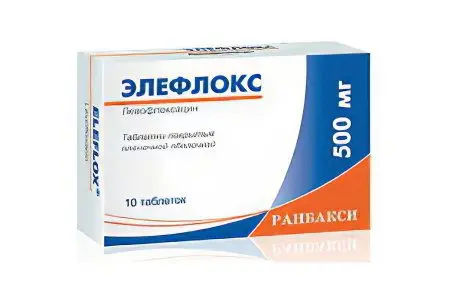
Eleflox is an antibacterial drug from the group of fluoroquinolones with the main active ingredient Levofloxacin. The drug is available in tablets and in solution for infusion. Eleflox is the drug of choice in the treatment of prostatitis.
Pros
The main advantage of Eleflox is its high activity against gram-positive and gram-negative bacteria, which most often provoke the development of prostatitis. Among such microorganisms: E. coli, Klebsiella, Proteus mirabilis, fecal enterococcus, Pseudomonas aeruginosa, ureaplasma, chlamydia and mycoplasma. Thanks to taking the drug Elefloks, the improvement occurs after a few days.
Another advantage of the drug is its proven microbiological and clinical efficacy. It has a high pharmacokinetic profile and penetrates well into the tissues of the prostate gland, which is essential for the successful treatment of prostatitis.
Eleflox based on Levofloxacin is a second-generation fluoroquinolone drug, it is twice as well tolerated by patients than first-generation fluoroquinolones, and also shows high efficiency against penicillin-resistant bacterial strains. This is a significant plus of the drug.
It has been established that after taking the drug, its concentration in the prostate gland is 4 times higher than the concentration in the blood plasma. As a result, the bacteria inhabiting the tissues of the prostate quickly die, since Eleflox causes profound changes in the cytoplasm, membranes and cell wall of pathogenic microorganisms.
The next advantage of the drug Elefloks is that it is available both in the form of tablets and in the form of a solution for infusion. Therefore, you can choose the method of taking the drug, which will be optimal for a particular patient.
Cons
The main disadvantage of the drug is the presence of contraindications to its use. It is strictly forbidden to take it for the treatment of prostatitis in the event that a person has a suspicion of tuberculosis. The fact is that fluoroquinolones are included in the treatment regimen for tuberculosis, but effective therapy will require the simultaneous administration of several antibiotics at once. If a person infected with Koch’s bacillus takes Eleflox for the treatment of prostatitis, then further anti-tuberculosis therapy may not work. Other contraindications include epilepsy, hypersensitivity to fluoroquinolones in general, and age under 18 years of age.
One of the disadvantages of the drug is its high cost, which starts from 700 rubles and more for tablets, and from 420 rubles for a solution.
It is worth noting such a minus of the drug Elefloks as side effects that may develop against the background of its use. Among them are various allergic reactions, nausea, diarrhea, headaches, dizziness, increased heart rate, etc.
When treating with Eleflox, it should be remembered that it is able to interact with other drugs, which can also be attributed to its disadvantages. For example, when taken simultaneously with glucocorticosteroids, the risk of tendon rupture increases. Therefore, it is necessary to start treatment with this antibacterial drug only after a medical examination.
Ceiling
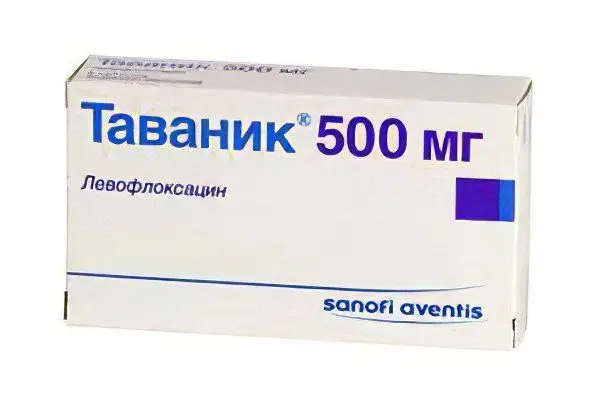
Tavanic is an antibacterial drug for the treatment of prostatitis with the main active ingredient Levofloxacin. Tavanic belongs to the fluoroquinolones.
Pros
The main advantage of Tavanic is its wide spectrum of antibacterial activity. Moreover, it is effective against most bacteria that are the causative agents of infectious prostatitis. These are not only gram-positive and gram-negative microorganisms, ureaplasmas, mycoplasmas, gonococci, but also anaerobes. Sensitivity to the drug Tavanic has Escherichia coli, which very often causes inflammation of the prostate.
Tavanic belongs to the second generation fluoroquinolone antibiotics, that is, it shows a higher activity in terms of getting rid of various bacteria and is better tolerated by patients.
The drug is produced by the well-known group of companies Sanofi Aventis, which is one of the global leaders in the field of healthcare. This means that the drug meets all international safety requirements and has passed all the necessary clinical trials.
Another advantage of Tavanic is its high ability to penetrate and accumulate in prostate tissues. Moreover, the intracellular concentration of the main active substance is 8-9 times higher than its extracellular concentration. This allows you to effectively use the drug Tavanic for the treatment of intracellular pathogens of prostatitis – chlamydia, ureaplasma and mycoplasma.
It is worth noting such a plus of the Tavanic drug as the presence of several dosage forms: it is available in tablets with various dosages and in the form of a solution for infusion.
Cons
The main disadvantage of Tavanic is the presence of contraindications to its use. These include: epilepsy, hypersensitivity to fluoroquinolones, age under 18 years, the presence of tendon damage during treatment with quinolones. Do not prescribe a drug for the treatment of prostatitis to people with suspected tuberculosis. Therefore, if there is any doubt, it is necessary to take appropriate tests.
The disadvantages of the drug include side effects. More often than others, there are: diarrhea, nausea, headache, drowsiness, sleep disturbance, asthenia, an increase in hepatic transaminases is possible. Other side effects are observed with less frequency – these are fever, hepatic reactions, tendon ruptures, etc.
With caution, the drug should be taken against the background of treatment with other drugs. For example, with NSAIDs, glucocorticosteroids, vitamin K antagonists, Cimetidine, etc.
The last disadvantage of the drug Tavanic can be considered its high cost. So, the price for 5 tablets with a dosage of 500 mg starts from 590 rubles. A bottle with a solution for infusion costs from 1250 rubles.
Tsifran
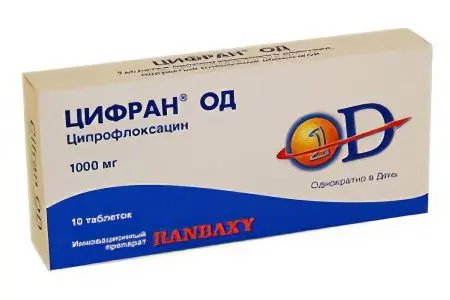
Cifran is an antibacterial drug from the group of fluoroquinolones, with the main active ingredient Ciprofloxacin. Cifran is the drug of choice in the treatment of prostatitis.
Pros
The main advantage of the drug Cifran is its high activity against bacteria that cause inflammation of the prostate gland. It is prescribed for prostatitis caused by microbes of the intestinal group (E. coli, Klebsiella, Proteus, Enterobacter, etc.). Trichomonas, ureaplasmas, Staphylococcus aureus, chlamydia trachomatis, anaerobic bacteria and other pathogenic flora that can provoke the development of inflammation of the prostate gland respond well to Cifran.
The advantage of the drug Tsifran is that it begins to act very quickly. This is possible due to the high bioavailability of the drug, which accumulates in high concentrations in the tissues of the prostate. Under such conditions, the bacteria lose their viability, and recovery occurs.
Due to the clinically proven efficacy of Cifran in the treatment of prostatitis, it is prescribed not only to get rid of the acute, but also the chronic form of the disease. And Tsifran more effectively fights against Pseudomonas aeruginosa, compared with drugs based on Levofloxacin.
The advantages of the drug include its relatively low cost, which is about 300 rubles.
Cons
Cifran, with the main active ingredient Ciprofloxacin, belongs to the first generation fluoroquinolones, while there are already 2nd generation drugs. Therefore, when treating prostatitis with Cifran, there is a higher risk that the bacteria will become resistant to it. In addition, first-generation fluoroquinolones are worse tolerated by patients than second-generation drugs. This can be attributed to the disadvantages of the drug.
Cifran has moderate activity against atypical pathogens of inflammation in the prostate gland, which somewhat limits its scope. The disadvantages of the drug Cifran include the presence of side effects, including: nausea, diarrhea, skin rash, candidiasis of the mucous membranes, hepatitis, eosinophilia, arthralgia, headaches, sweating, urticaria, taste disturbances, etc.
The drug should not be used to treat children under 18 years of age, to treat patients with pseudomembranous colitis. It is not prescribed for people with a history of hypersensitivity to fluoroquinolones.
Ciprobai
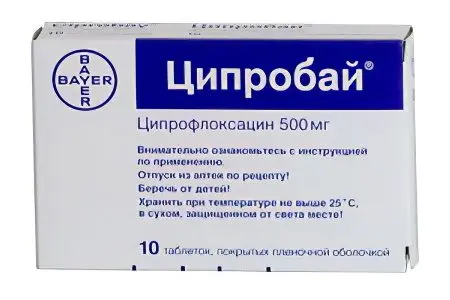
Tsiprobay is the antibacterial drug of choice in the treatment of prostatitis. It belongs to the group of fluoroquinolones, the main active ingredient in it is Levofloxacin.
Pros
Cyprobay is an antibacterial drug that has a detrimental effect on gram-positive and, to a greater extent, gram-negative bacteria, which are common causative agents of prostatitis. It has been proven to be highly effective against chlamydia, mycoplasma, ureaplasma, gram-negative bacteria of the intestinal group, anaerobes.
The drug, when taken orally, is rapidly absorbed and well distributed throughout the tissues, accumulating in high concentrations in the prostate gland. This leads to the death of the pathogenic flora and the rapid elimination of the disease.
Another advantage of the drug is two forms of release: a solution for infusion and tablets, which allows the treatment of prostatitis more effectively, starting with intravenous administration of the drug, and then moving on to oral administration.
The drug is produced by the well-known pharmaceutical company Bayer, which has been creating and selling medicines since 1863. Therefore, you can be sure that Tsiprobay is a high-quality antibiotic that has passed all the necessary clinical trials.
The price of the drug is relatively low, for a package of tablets in a dosage of 500 mg you will have to pay about 370 rubles.
Cons
Cyprobay is a first generation fluoroquinolone. Therefore, the risk of developing resistance in bacteria to the drug is higher than to second-generation fluoroquinolones. This can be considered the main disadvantage of the drug.
The second disadvantage of the drug Tsiprobay is the presence of contraindications to its use, including: age under 18, epilepsy, organic brain damage, mental illness. With caution, the drug is prescribed to the elderly.
The third disadvantage of the drug can be called the presence of side effects – these are fungal lesions of the mucous membranes, eosinophilia, loss of appetite, diarrhea and nausea, headache, taste distortion, sleep disturbance, etc.
Before starting treatment, you should definitely visit a doctor, as the drug is able to interact with other drugs, which can provoke an increase in side effects.
Cyprinol
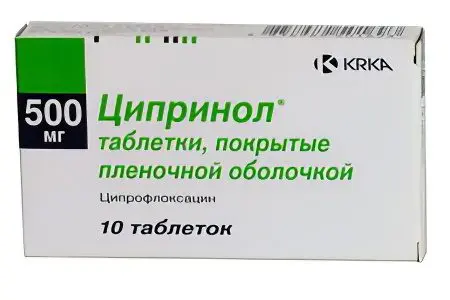
Tsiprinol is an antibacterial drug with the main active ingredient Ciprofloxacin. Tsiprinol belongs to the group of first-generation fluoroquinolones and is the drug of choice for the treatment of prostatitis.
Pros
The main advantage of the drug Tsiprinol is its pronounced bacteriostatic activity against most pathogens of prostatitis. The drug has a wide spectrum of action, inhibiting the enzyme DNA gyrase of bacteria, which makes it impossible to start the process of protein synthesis in their cells. As a result, the pathogenic flora dies.
The drug has low toxicity to humans, since DNA gyrase is absent in its cells.
Another plus of Tsiprinol is its high activity against bacteria that are resistant to aminoglycosides, penicillins, cephalosporins and tetracyclines. Prostatitis caused by gram-negative bacteria (enterobacteria, E. coli, shigella, pseudomonas, moxarella, legionella, listeria, etc.) responds well to treatment with Ciprinol. Some gram-positive aerobes are sensitive to the drug: staphylococci and streptococci.
An important advantage of the drug is that it has a high bioavailability and accumulates in high concentrations in the tissues of the prostate gland. Cyprinol is able to destroy bacteria that multiply and that are at rest.
Another advantage of the drug Tsiprinol is its affordable price. So. For 10 tablets of 500 mg, you will have to pay about 120 rubles.
Cons
The main disadvantage of the drug is that some bacteria may not be sensitive to it. For example, corynebacteria, fragilis bacteroids, some types of Pseudomonas, treponema. Bacteria resistant to methicillin are resistant to Tsiprinol. The drug is a first-generation fluoroquinolone, while second-generation antibiotics have been developed that have higher antimicrobial activity and are better tolerated by patients.
Another disadvantage of the drug is that it has a number of side effects. Most often, patients complain of nausea and diarrhea, although the development of a fungal infection, pseudomembranous colitis is not excluded, sometimes allergic reactions occur, up to angioedema and anaphylactic shock. Changes are possible on the part of metabolism, on the part of the nervous system, organs of vision, etc. However, the frequency of side effects is not high and most often Tsiprinol is well tolerated by patients.
It is worth noting such a minus of the drug as contraindications to its use. It is strictly forbidden to prescribe Tsiprinol for the treatment of prostatitis in people with hypersensitivity to fluoroquinolones, in patients with chronic renal failure, in children and adolescents under 18 years of age.
Tsiprinol is able to interact with other drugs. For example, it should not be taken with tizanidine, as this may cause a drop in blood pressure levels.
Zanocin
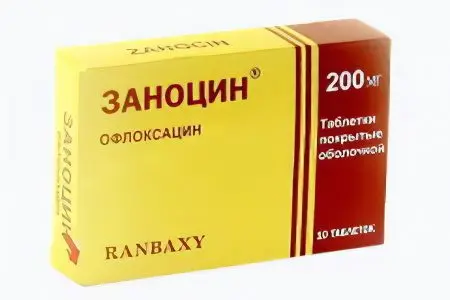
Zanocin is a broad-spectrum antibacterial drug with the main active ingredient – Ofloxacin. Zanocin is a second-generation fluoroquinolone.
Pros
Zanocin is the drug of choice in the treatment of prostatitis. The main active ingredient perfectly penetrates into the tissues and secretion of the prostate gland and covers a huge range of prostatitis pathogens.
An important advantage of the drug Zanocin is its high activity against most gram-negative microbes of the intestinal group (E. coli, Klebsiella, Proteus, Enterobacter), as well as against Pseudomonas, Trichomonas, Ureaplasma, Mycoplasma and other pathogens of prostatitis. Sensitive to Zanocin strains of bacteria that are resistant to antibiotics of other groups.
The undoubted advantage of Zanocin is that it can be used during complex antibacterial therapy, that is, it is prescribed with cephalosporins, macrolides, beta-lactam antibiotics.
The drug is available in two forms: in tablets and in the form of a solution for infusion. At the same time, it has an equivalent bioavailability for oral and parenteral administration, so there is no need for dose adjustment. This is a significant plus of the drug, for example, compared with drugs based on Ciprofloxacin.
The price range of the drug is average. So, Zanocin tablets at a dosage of 400 mg can be purchased at a price of about 314 rubles.
Cons
Although Zanocin is the drug of choice for treating prostatitis, some bacterial strains may be resistant to it. For example, E. coli gives resistance to Zanocin in 4,3% of cases in Russia as a whole. In some regions, this figure is higher, for example, in St. Petersburg it is 13%. Therefore, it is recommended to use preparations based on Ofloxacin in the treatment of uncomplicated prostatitis.
Another disadvantage of the drug is the presence of side effects, including: nausea, vomiting, diarrhea, fatigue, increased intracranial pressure, tachycardia, anemia, leukopenia, impaired kidney function, etc.
The next drawback of the drug is its ability to interact with other drugs, which often leads to an increase in their side effects. For example, it is impossible to combine taking Zanocin and Theophylline, as this will lead to a sharp drop in blood pressure. And the simultaneous use of Zanocin with NSAIDs increases its side effects on the central nervous system.
Zanocin is not prescribed for the treatment of prostatitis in people with hypersensitivity to fluoroquinolones, it should not be used to treat children and adolescents under the age of 18 years.
Ofloxin
Ofloxin is a broad-spectrum antibacterial drug related to second-generation fluoroquinolones. The main active ingredient is Ofloxacin.
Pros
Ofloxin is one of the most highly active antibacterial drugs for the treatment of prostatitis. It is able to destroy most gram-negative and gram-positive microorganisms, and is also effective against strains resistant to other antibiotics. The greatest activity of the drug is expressed against intracellular parasites (mycoplasma, chlamydia, ureaplasma), as well as against gram-negative flora (E. coli, enterobacteria, etc.).
Another advantage of Ofloxin is its high bioavailability, which ranges from 95 to 100%. In addition, it does not differ between oral and parenteral administration, which does not require dose changes when changing the route of administration. This is quite relevant for the treatment of prostatitis, since a stepwise scheme is often used.
The next advantage of the drug is that it perfectly hits the target organs. In this case, we are talking about the tissue and the secret of the prostate gland.
Another advantage of the drug: Ofloxin does not have a pathogenic effect on bifidus and lactobacilli, and therefore does not contribute to the violation of the intestinal microflora.
It should be noted that, unlike most other fluoroquinolones, Ofloxin does not give any clinically significant phototoxic effect and does not interact with Theophylline.
The price of Ofloxin is very acceptable, for 10 tablets at a dosage of 200 mg you will need to pay about 180 rubles.
Cons
The main disadvantage of Ofloxin is the presence of side effects that occur on average in 4-8% of patients. Most often they are associated with disruption of the digestive tract, central nervous system and skin. Among them: nausea, vomiting, gastralgia, headaches, sleep disturbance, increased anxiety, skin rash and itching, urticaria, petechiae, papular rash, etc.
Another disadvantage of the drug is that it is not used to treat people with hypersensitivity to fluoroquinolones, to treat children and adolescents under 18 years of age.
Some strains of Escherichia coli are resistant to Ofloxin (about 4,3% of cases), which can lead to ineffective use of the drug for the treatment of prostatitis. Moderate resistance to Ofloksin is shown by some strains of gram-positive bacteria.
Unidox Solutab
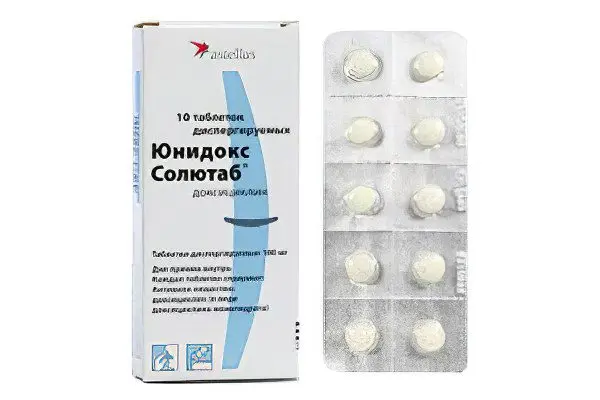
Unidox Solutab is a broad-spectrum antibacterial drug from the tetracycline group. The main active ingredient is Doxycycline.
Pros
Unidox Solutab is practically the only drug from the tetracycline group that modern proctologists use to treat prostatitis, since it is more easily tolerated by patients than others.
Unidox Solutab has antibacterial activity against ureaplasma, mycoplasma, chlamydia, Klebsiella, enterobacteria, Pseudomonas and E. coli.
Another advantage of the drug is its high bioavailability, which is 100%. Already half an hour after the first dose, the dose of the medicinal substance that is necessary to provide a therapeutic effect will be concentrated in the prostate gland.
Unidox Solutab is available in the form of dispersible tablets, which makes taking the drug very convenient.
The price of the drug is not very high and is about 350 rubles for a pack of 10 tablets.
Cons
The main disadvantage of Unidox Solutab is that such possible pathogens of prostatitis as Proteus, Serrata, some strains of Pseudomonas, Acinetobacter, symbiotic enterococci are resistant to it. In addition, resistance to Unidox Solutab, which occurs in the treatment of prostatitis, will be extended to other drugs from the tetracycline group. Therefore, in some cases, it is required to replace the drug with a radically different antibiotic.
Another disadvantage of the drug is that it is not prescribed for the treatment of people with severe disorders of the kidneys and liver, with porphyrin disease, with hypersensitivity to tetracyclines.
Another disadvantage of Unidox Solutab is the side effects that may occur after taking it, including: anorexia, nausea, diarrhea, enterocolitis, allergic reactions, liver damage, anemia, eosinophilia, increased ICP, etc.
Suprax
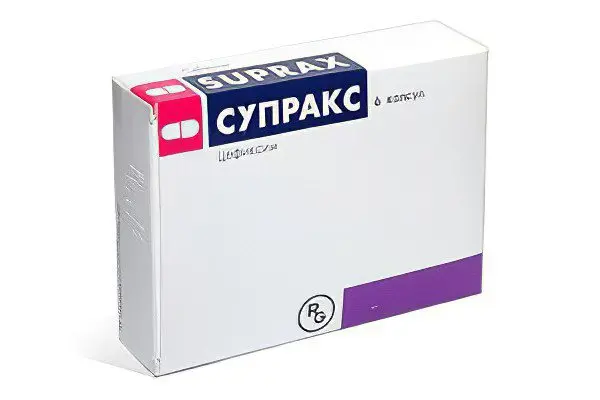
Suprax is a broad-spectrum antibacterial drug from the group of cephalosporins (3rd generation of drugs). The main active ingredient is cefixime.
Pros
The main advantage of Suprax in the treatment of prostatitis is its high antibacterial activity against gram-negative bacterial strains. Suprax allows you to get rid of prostatitis caused by gonococci, enterobacteria, Proteus, Klebsiella and E. coli.
Suprax is a drug for oral administration. It has three forms of release – in capsules, in tablets, in suspension, so it can be used for treatment not only in a hospital, but also at home.
The drug is produced by the well-known company Astellas, which is one of the 20 leading pharmaceutical companies in the world. Therefore, the drug has passed all the necessary clinical trials, which is its undoubted advantage.
Taking the drug Suprax does not have a pronounced effect on the human immune system, does not reduce the protective functions of the body, which is also its advantage over some other antibiotics.
Cons
Suprax does not have a high permeability in the prostate tissue, which is a significant disadvantage of the drug in the treatment of prostatitis.
Another drawback of the drug is the insensitivity to it of such bacteria as: ureaplasma, mycoplasma, chlamydia, enterococci, pseudomonads, seration, listeria. Therefore, if prostatitis was caused by one of these microorganisms, the therapeutic effect cannot be achieved. Or you will have to use Suprax in combination with other antibiotics.
Another disadvantage of the drug is its high cost. So, for a package with 6 capsules at a dosage of 400 mg, you will have to pay about 700-800 rubles.
It is worth noting such a drawback of the drug as the presence of side effects. Perhaps the occurrence of allergic reactions, the appearance of dry mouth, the development of diarrhea, nausea, flatulence, vomiting, dizziness and headaches.
Cefotaxime
Cefotaxime is a broad-spectrum antibiotic from the group of third-generation cephalosporins with the main active ingredient Cefotaxime.
Pros
The main advantage of Cefotaxime is its extended spectrum of action compared to previous generations of cephalosporins, as it has increased resistance to beta-lactams. Therefore, Cefotaxime can be prescribed for the treatment of complicated prostatitis.
The drug is active against most bacteria that provoke prostatitis, including: E. coli, gonococci, enterobacteria, Klebsiella, Proteus, staphylococci. Cefotaxime can help to get rid of the disease, even when there is no effect from treatment with tetracyclines, penicillins and aminoglycosides. Often it is used in the complex therapy of prostatitis.
It should also be noted such a plus of the drug as the absence of contraindications to its use, with the exception of hypersensitivity reactions to cephalosporins.
The price of the drug is not high, so a bottle with 1 g of the active substance can be purchased for 20-40 rubles.
Cons
One of the disadvantages of the drug can be called the fact that it is allowed to be used only for parenteral administration. The drug is not available in tablets or capsules, that is, oral administration is not available.
Treatment with Cefotaxime is carried out only in a hospital setting.
Another disadvantage of Cefotaxime is the presence of side effects, including: local reactions to the administration of the drug, skin rashes, disorders of the digestive tract, pseudomembranous colitis, headaches, etc.
Ceftriaxone
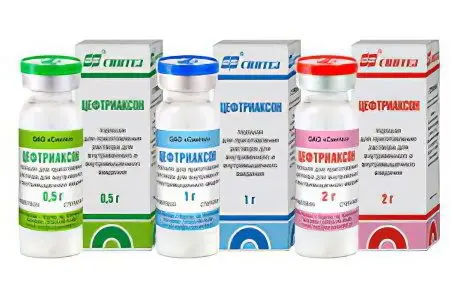
Ceftriaxone is a broad-spectrum antibiotic from the group of third-generation fluoroquinolones.
Pros
The main advantage of the drug is that it has a pronounced bactericidal effect. It can be used to treat prostatitis caused by Gram-positive and Gram-negative bacteria.
Another plus of Ceftriaxone is its increased resistance to beta-lactamase enzymes produced by most pathogenic microorganisms. This means that the drug will be effective even where other antibacterial agents (penicillins and even cephalosporins of previous generations) fail.
When administered parenterally, the drug penetrates well into the tissues and fluids of the prostate. Moreover, the drug has practically no contraindications, with the exception of the possibility of a hypersensitivity reaction to cephalosporins.
The price of Ceftriaxone is not high. The average cost of 1 bottle with 1 g of the active substance varies between 22-30 rubles.
Cons
One of the disadvantages of the drug is that it can only be used for parenteral use. Therefore, treatment with Ceftriaxone is carried out only in a hospital setting.
Another disadvantage of the drug is the possibility of side effects after its administration. These include: diarrhea, nausea, vomiting, eosinophilia, allergic dermatitis, urticaria, headaches, congestion in the gallbladder.
Claforan
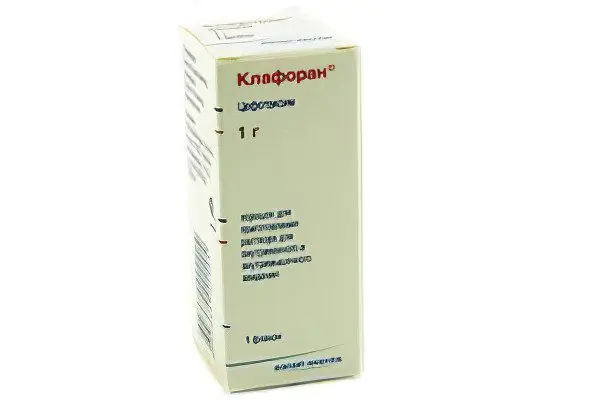
Klaforan is a broad-spectrum antibiotic from the group of third-generation cephalosporins. The main active ingredient is Cefotaxime.
Pros
The main advantage of the drug Klaforan in the treatment of prostatitis is that it has bactericidal properties against gram-negative and gram-positive pathogenic flora. Unlike some other cephalosporins, Klaforan has a detrimental effect on bacteria that synthesize beta-lactamase. Therefore, it can be used to treat patients who have not responded to tetracycline and other antibiotic therapy.
The drug is produced by the well-known pharmaceutical company Sanofi Aventis, which means that it has a high degree of purification.
The drug has practically no contraindications. It should not be used solely for the treatment of patients with hypersensitivity to cephalosporins in general.
Cons
One of the main disadvantages of the drug is that it can be used exclusively for parenteral administration. Therefore, Klaforan treatment is carried out only in a hospital setting.
It is also worth noting such a drawback of the drug as its relatively high price compared to other 3rd generation cephalosporins. So, 1 bottle with a dosage of 1 g will cost from 155 rubles.
The disadvantages of the drug include the possibility of side effects, including: disorders of the digestive system (nausea, diarrhea, loss of appetite), allergic reactions, arrhythmia, encephalopathy, fever, pain at the injection site, etc.
Amoxiclav
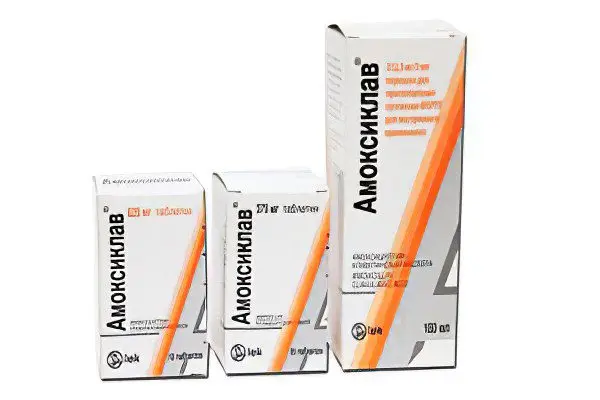
Amoxiclav is a broad-spectrum antibiotic, with the main active ingredient amoxicillin + clavulanic acid. The drug belongs to the group of penicillins.
Pros
The main advantage of Amoxiclav in the treatment of prostatitis is that it effectively fights bacteria that produce beta-lactamase enzymes. This allows you to have a pronounced bactericidal effect against a wide range of pathogenic microorganisms.
To date, Amoxiclav is one of the most effective antibiotics for the treatment of prostatitis among penicillins. It allows you to get rid of such bacteria that cause prostatitis, such as: gonococci, enterobacteria, enterococci, Klebsiella, Proteus, seracia, E. coli and some others.
The drug was developed by the famous pharmaceutical company SmithKline Beecham Pharmaceuticals. Therefore, you can not worry about the quality and safety of the drug.
Another advantage of Amoxiclav is its selective activity against bacterial cells. That is, it recognizes pathogenic cells and destroys them, while healthy tissues are not damaged.
The advantage of the drug is its relatively low price. So, a package of Amoxiclav tablets 20 pieces in a dosage of 500 mg can be purchased for 300-400 rubles.
Cons
The main disadvantage of the drug in the treatment of prostatitis can be considered its low efficiency against bacterial strains such as: ureaplasma, mycoplasma, chlamydia and pseudomonads. Therefore, although Amoxiclav is a semi-synthetic aminopenicillin protected by clavulanic acid, it may not be effective in the treatment of prostatitis caused by atypical or resistant flora.
Another obvious disadvantage of Amoxiclav is that it can provoke a number of side effects, including: nausea, diarrhea, vomiting, heartburn, liver and kidney disorders, allergic reactions, fungal infection, etc.
Flemoklav solutab
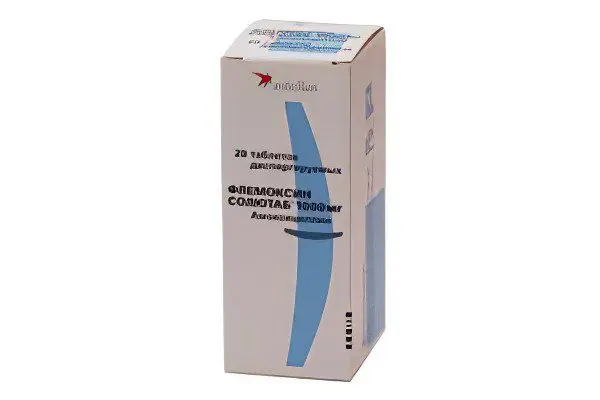
Flemoclav Solutab is an antibiotic from the penicillin group with the main active ingredient Amoxicillin + potassium clavulanate.
Pros
Flemoklav Solutab, like Amoxiclav, is a protected penicillin, which ensures its high antibacterial activity against most bacteria that can provoke the development of prostatitis.
An important advantage of the drug Flemoklav solutab is that it is available in the form of dispersible tablets. This makes it convenient to take for some groups of patients. Moreover, this form of release has a gentle effect on the gastric mucosa and is more easily absorbed by the body.
It is impossible not to mention such a plus of the drug Flemoklav solutab, as its ability to fight beta-lactamase strains of bacteria that are resistant to a number of other antibiotics.
Cons
Among the disadvantages of the drug Flemoklav solutab is its high cost compared to other forms of penicillins with clavulanic acid. So, for the packaging of the drug, it will be necessary to pay 400-500 rubles.
Also, the disadvantages of the drug include the presence of contraindications to its use, including: hypersensitivity to the components of the drug, jaundice, liver dysfunction, infectious mononucleosis, lymphocytic leukemia.
It is worth noting such a minus of the drug as the presence of side effects that may occur while taking it. Most often, patients suffer from diarrhea and nausea, as well as fungal infections that occur against the background of dysbacteriosis. It is also possible to develop allergic reactions, exanthema, candidiasis, hepatitis and other undesirable reactions.
Augmentin
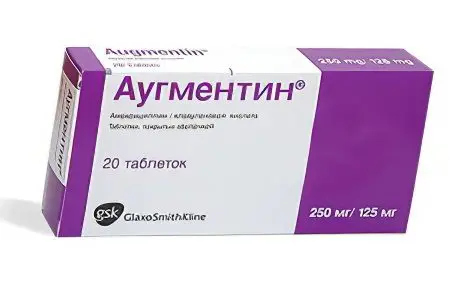
Augmentin is a broad-spectrum antibiotic containing Amoxiclav and clavulanic acid.
Pros
The main advantage of Augmentin is its resistance to bacteria that produce beta-lactamase enzymes, which is possible due to clavulanic acid in its composition. Augmentin acts against many strains of gram-positive and gram-negative bacteria that can provoke the development of prostatitis.
The drug is available in tablets, in the form of a powder for the preparation of a suspension, in the form of a powder for intravenous and intramuscular administration. This is also an important advantage of the drug Augmentin, as it makes it possible to use it for different groups of patients.
Cons
One of the disadvantages of the drug is its high cost, which, depending on the form of release of the drug, can reach 1800 rubles.
The disadvantages of Augmentin include its resistance to some atypical pathogens of prostatitis, including strains of mycoplasma, ureaplasma, chlamydia, pseudomonas, as well as some gram-negative anaerobes.
Separately, it should be noted the side effects that may occur while taking Augmentin. Most often, patients complain of diarrhea, a feeling of nausea and fungal infections. Although there may be a violation of the work of such organs and systems as: the central nervous system, the lymphatic system, the immune system, the liver, the gallbladder, blood vessels, the urinary tract, the skin.
Flemoxin solutab

Flemoxin Solutab is a broad-spectrum antibiotic based on Amoxicillin. The drug belongs to the group of penicillins.
Pros
Flemoxin Solutab has activity against a number of gram-negative and gram-positive bacteria that can cause prostatitis. These are some strains of staphylococci, streptococci. Moderate activity shows the drug against enterococci, Proteus, Salmonella, Shigella.
The drug is released in the form of dispersible tablets, which makes it convenient to take it for some categories of patients. In addition, the trihydrate is better absorbed by the gastrointestinal tract and does not irritate the gastric mucosa.
The drug is produced by Astellas, which has proven itself in the pharmacological market. This means that the drug meets all global safety standards.
The drug is in the middle price range. It can be purchased at a price of 230 rubles and above, depending on the dosage.
Cons
The drug is not effective against bacteria producing beta-lactamase enzymes, against Pseudomonas, Enterobacter, Ureaplasma, Mycoplasma, Chlamydia and some other pathogenic microorganisms. Therefore, the treatment of prostatitis with Flemoxin Solutab alone may be ineffective. This is the main disadvantage of the drug.
It is also worth noting the presence of side effects that may occur when taking it: a change in taste, vomiting, diarrhea, nephritis, agranulocytosis, skin reactions, etc.
Gentamicin

Gentamicin is a broad-spectrum antibacterial drug from the group of aminoglycosides.
Pros
The main advantage of the drug is its high antibacterial activity against gram-negative flora, which can provoke the development of prostatitis, for example, against Salmonella, Enterobacter, Klebsiella, Proteus, Pseudomonas, etc.
The drug is rapidly absorbed into the blood and already an hour after its administration in plasma, its therapeutic concentration is observed.
A significant advantage of the drug is its low price. So, a package of 10 ampoules can be purchased for only 40-50 rubles.
Cons
One of the significant disadvantages of the drug Gentamicin is its limited spectrum of action, that is, it will be ineffective against some strains of bacteria that cause prostatitis. Therefore, it is most often used in a complex treatment regimen for inflammation of the prostate.
The disadvantages of the drug include the fact that it is administered only parenterally. Oral administration of the drug is not available.
Also a minus of Gentamicin are its numerous side effects, including: vomiting, nausea, anemia, leukopenia, oliguria, renal failure, headaches, increased drowsiness, hearing impairment, etc.
The drug has contraindications for use, for example, neuritis of the auditory nerve, impaired renal function.









